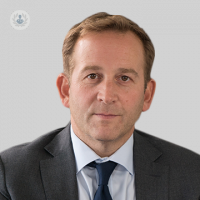When is liver surgery a must?
Written in association with:We were fortunate enough at Top Doctors to chat with highly regarded London-based consultant general surgeon, Mr Charles Imber, to discuss at length how liver surgery is performed, when it is the right time to undergo it, recovery time, and the associated risks.

When is liver surgery a must? Are there any alternatives that are as equally effective?
Alternative treatments range from simple observation for a condition that is not yet cancerous but that has the potential to become cancerous (an adenoma in the liver) through surgery to radiofrequency ablation.
Surgery allows the whole tumour to be removed and often guarantees a cure from liver cancer. Surgery is required to treat underlying liver conditions that might put patients at a higher risk of developing liver cancer. There are other treatment options, but surgery is far more effective.
Are there any patients who might not be suitable for liver surgery?
You certainly need to have underlying physiological reserve to withstand moderate to major surgery. We check that patients are fit enough for liver surgery. If they are not fit enough for this surgery, we can actually optimise their other medical conditions prior to liver surgery, so we can then perform it safely.
How exactly is it performed?
Patients are asleep during liver surgery. It involves incisions being made on the stomach, sometimes one large incision or multiple small incisions (if we are performing minimally invasive liver surgery) and it usually involves removal of parts of or all of the liver to remove a specific tumour.
We perform an ultrasound scan on the liver to detect where exactly the tumours are on the liver, and we then remove those tumours. We can also look for smaller tumours that may have not been seen on the scan.
We then cut out that piece of liver, and we use an instrument that cuts through the liver (bloodlessly). It almost cuts the liver like a book. We can preserve the rest of the liver, which then regenerates. We then close the abdomen area very carefully. Patients will then be transferred to an intensive care unit after the surgery for observation.
What are the main potential risks?
We need to ensure that there is no risk that the patient will be left with an insufficient amount of liver after parts of it is removed in the surgery. There is also a risk of bleeding, bile leaking from the cut surface, and infection.
What does recovery time entail?
Patients will generally have to spend four to five days in hospital following liver surgery. We won’t allow patients to be discharged from hospital until they are mobile, eating well, they are going to the toilet properly, and their wound is healing properly. It can be six to eight weeks at home to fully recover mentally and physically.
If you are set to undergo liver surgery in the near future, be sure to contact Mr Charles Imber today via his Top Doctors profile to find out all you need to know about the procedure before having it.


